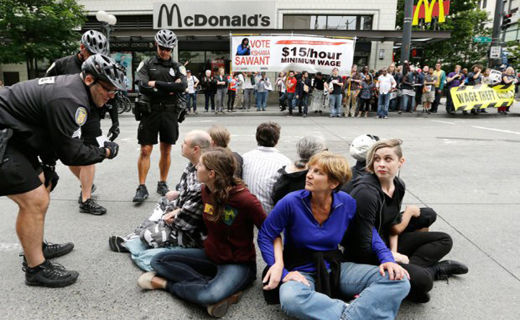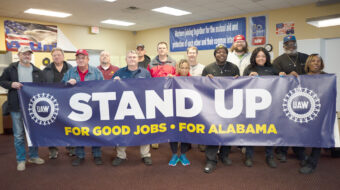
LOS ANGELES – Young workers were the hot topic at a gathering of labor journalists in town to cover what many expect to be an historic AFL-CIO convention next week. During one of several breakout sessions at the International Labor Communications Association convention here Sept. 5-7, union leaders and organizers talked about the work force of tomorrow, and how the labor movement can relate to it.
One thing was made clear: Resting on the laurels of tradition is not the way to go. It’s time to come up with exciting new ideas.
That was the gist of what Frank Polito, communications director for the California School Employees Association, said as he looked back on a time when labor was not so conducive to moving young people forward. “When someone joined our union,” he said, “they would get this information packet. And on the cover was an 85-year-old woman doing her job as a secretary. Eventually, we started to think, ‘Maybe that’s not the best image to communicate to someone in their 20s.'”
“Every generation faces this problem: trying to connect with the younger people,” Polito said. “But for the first time, we have four different generations working side by side.” Each generation tries to pass on its own values to the next, especially in the workplace, he said, but “cultural shifts mean that the newest workers may look at things a bit differently than the older generation.”
“Young workers don’t have the same sense of security that previous generations had,” he added as one example. “And after seeing their grandparents and parents spend their entire lives at a certain workplace, only to lose their pensions and get downsized, they are more prepared than their elders to move around from job to job, picking up skills as they go.”
Unions need to accommodate such changes, Polito said. They need to provide young people with a lot of orientation, large teams, and a strong leader, he said.
Chris Policano, communications director for AFSCME, said a renewed focus on, and understanding of, young workers, needs to happen on a national level. “In August 2006, AFSCME held its convention in Chicago,” he reflected. “We had a round-table discussion about engaging people and turning them on to unions. But less than 5 percent of the people in the room were below the age of 35. It prompted important questions. How do we change that? What does that mean for the future? And how do we get all unions to move forward on this?”
Unions need to provide a healthy atmosphere for new young workers, Policano explained. But older workers have to be mindful that there are new ways to do things. “Talking about the great tradition of labor wasn’t what was turning people on. It was talking about current problems.” He pointed to the Occupy movement which, he noted, was obviously driven by young people’s concern over current dilemmas ranging from good jobs to issues of equality. “So it’s about recognizing them and their concerns, not talking at them,” he said.
Social media, Policano said, is also something that older workers need to adapt to for the sake of the new generation. “Facebook is really good at moving groups back and forth when we’re doing protests and other demonstrations,” he said. “It’s a good tool for quickly mobilizing people in certain areas for that purpose. So we need to pay attention to it. We have to integrate what young people value into the overall labor struggle. It’s time to let young folks do their thing.”
Rebecca Greenberg Band, communications organizer for the California Labor Federation and president of the California Young Workers Council, called this new approach “alt-labor.” It’s about “stepping away from tradition and thinking outside the box,” Band said.
She cited, as an example of this, the Labor History Bar Tour in Chicago this June. Her union was one of many that participated in the event, which had young workers moving from bar to bar, and in between, exploring some of the world’s greatest labor history sites. Events like that, she said, really speak to people and combine a part of their world with the benefits and struggles of the past.
Our future union members are out there, Band said. “They’re struggling for better lives in the workplace, but many don’t yet know that they have the right to ask for better wages and unions. They’re really on our side, but they’re not yet connected. It’s time to re-establish new-member programs and mentorships, and overhaul existing ones. It’s time to reach out to them.”
Photo: Young workers, including fast food workers, may not have yet unionized, but they are holding demonstrations all over the country for decent wages and working conditions. At the ILCA convention, union leaders said older workers need to be mindful of the new generation’s values and struggles. Elaine Thompson/AP












Comments